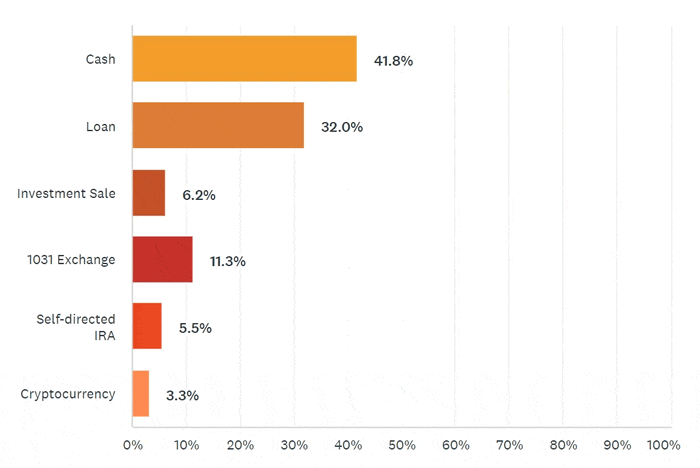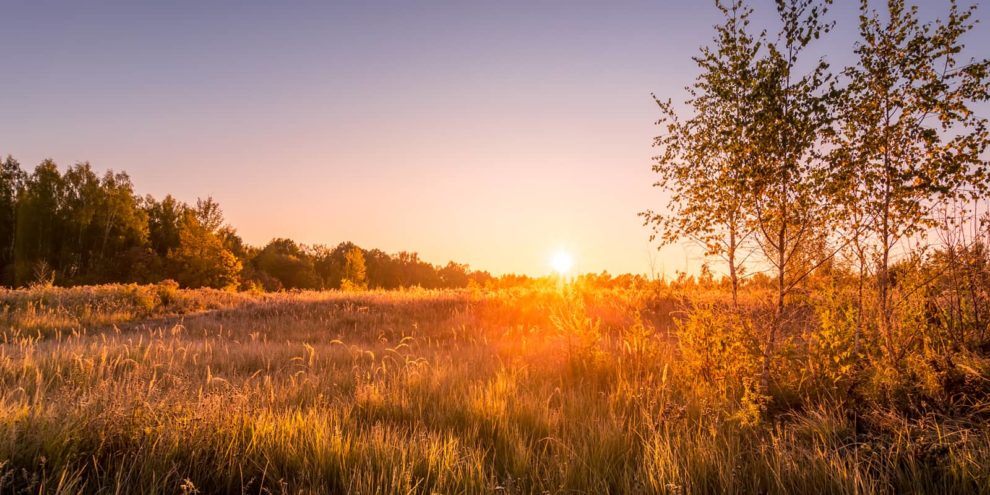According to the October LANDTHINK Pulse results, 41.8% of respondents indicated that cash would be their primary source of funds if they were to buy land today. With the COVID-19 crisis tapering off in the U.S., many thought the land market would be set to cool down and return to normal. So far, that hasn’t happened. With winter approaching, sales have decreased slightly, but it is still a very strong seller’s market, especially in the Southeastern U.S. Low inventory combined with Covid-induced demand have made buyers beyond competitive and sellers particularly picky.
Last month, the October Pulse asked: If you were to purchase rural land today, what would be your primary source of funds?
October Pulse Sponsored by
If the pandemic has been good to anybody, it’s been landowners listing their properties. Shopping for land in a tight market requires a different strategy to be successful and get your offer accepted. Paying cash is one tactic some buyers are leveraging to win bidding wars, since sellers are more likely to look favorably on an offer that doesn’t require a lender’s approval. As a result, all-cash deals are rising in certain regions and at certain price points.
A cash offer occurs when the buyer has enough liquid assets (meaning cash, or anything that can easily be converted to cash) available to buy land in full. If you have the money to buy rural land in cash, consider the following benefits and downsides.
Benefits of a Cash Offer
- Faster closing. Cash deals typically close faster and involve less hassle for both parties. This quicker timeline is enticing for sellers, because it puts money into a seller’s pocket sooner.
- Negotiating power. Making a cash offer puts the buyer in the driver’s seat. Buyers willing to pay with cash have an inherent advantage over those who need to obtain financing, and sometimes they can win over the seller at a lower price.
- No loan payments. Cash buyers will be able to enjoy their rural land without having to dedicate a portion of their income toward a monthly loan payment. This means more free cashflow every month.
- Save on closing costs and interest. If you buy land with cash, you can avoid many of the costs associated with closing the loan, and you won’t have to pay interest on the loan.
- Less temptation to overspend. When land buyers have to take out a land loan, they often think in terms of monthly payments rather than the total cost. But when you have to hand over a considerable amount of your own money, it makes the cost more tangible.
Downsides of a Cash Offer
- Fewer liquid assets. The downside of buying land with cash can include tying up too much capital in one asset class and sacrificing liquidity; you lock up all that money in the land and can’t easily access it. This might not be a bad thing if you don’t foresee any large expenses in the near future.
- Opportunity cost. Buying rural land with cash saves you money on interest, but your opportunity cost is all the money you could’ve earned by investing it instead.
- Land ownership delays. For some buyers, waiting until you have all the money you need set aside in cash- and not just for the purchase price- can delay your dream of land ownership. You could put down 25-50% down payment on a land loan and start enjoying your land immediately.
Coming in a close second, 32.0% said that a land loan would be their primary source of funds if they were to buy rural land today. Most land buyers are not in a position to tie up all their cash and instead take a loan to finance their land purchase.

Land is usually bought with cash and a loan, with the buyer paying a hefty down payment and financing the remaining balance. The amount of cash required as a minimum down payment is at the discretion of each individual lender, but land buyers can expect to provide 20-50% down or more on undeveloped land.
The process of getting a land loan is similar to that of getting a traditional mortgage. The different types of land loans available have varying qualifications, and you’ll generally need excellent credit, an acceptable debt-to-income (DTI) ratio of roughly 30% to 40% and consistent income.
In today’s market, how can you compete with cash buyers if you need financing to afford your desired property?
Bring your highest offer. If you are competing against cash buyers, out-bidding them might be your best weapon in winning the property.
Increase your Earnest Money Deposit (EMD). Earnest money is a demonstration in good faith that shows a seller you’re serious but it also means it will be easier for you to qualify for the amount you need to finance. The amount of money deposited is negotiable and submitted with an offer to purchase.
If you’re serious about buying land, whether as a cash buyer or through financing, you’re going to have to be decisive and ready to act. Land for sale is going under contract quickly and there’s no guarantee that a property you’re interested in today is going to be available tomorrow.
The majority of the LANDTHINK audience (41.8%) indicated that Cash would be their primary source of funds if buying land today. Coming in second, 32.0% said they would seek a Loan to purchase rural land. Only 11.3% indicated that they would use a 1031 Exchange as their primary source of funds, 6.2% said Investment Sale, 5.5% said Self-directed IRA, and just 3.3% said Cryptocurrency.
LANDTHINK would like to thank PotlatchDeltic for sponsoring the October Pulse and for choosing a very interesting question to pose to our audience. PotlatchDeltic is a leading Real Estate Investment Trust (REIT) that owns nearly 1.9 million acres of timberland in Alabama, Arkansas, Idaho, Minnesota, Louisiana and Mississippi. PotlatchDeltic, a leader in sustainable forest practices, is committed to providing superior returns to stockholders through long-term stewardship of its forest resources. The company also conducts a land sales and development business and operates wood products manufacturing facilities through its taxable REIT subsidiary.
Become a Pulse sponsor! It’s a great way to ensure your brokerage is the first one buyers and sellers call when they have a need to buy or sell property. You’ll get insane exposure on Social + Email + Web. That’s 500,000+ monthly eyes on you! Once you have it, you won’t want to give it up! Pulse sponsorships are offered on a first come first served basis and are subject to certain limitations. If your business is interested in becoming a Pulse sponsor or you want to suggest a question for the Pulse, please contact us.
This content may not be used or reproduced in any manner whatsoever, in part or in whole, without written permission of LANDTHINK. Use of this content without permission is a violation of federal copyright law. The articles, posts, comments, opinions and information provided by LANDTHINK are for informational and research purposes only and DOES NOT substitute or coincide with the advice of an attorney, accountant, real estate broker or any other licensed real estate professional. LANDTHINK strongly advises visitors and readers to seek their own professional guidance and advice related to buying, investing in or selling real estate.











Add Comment